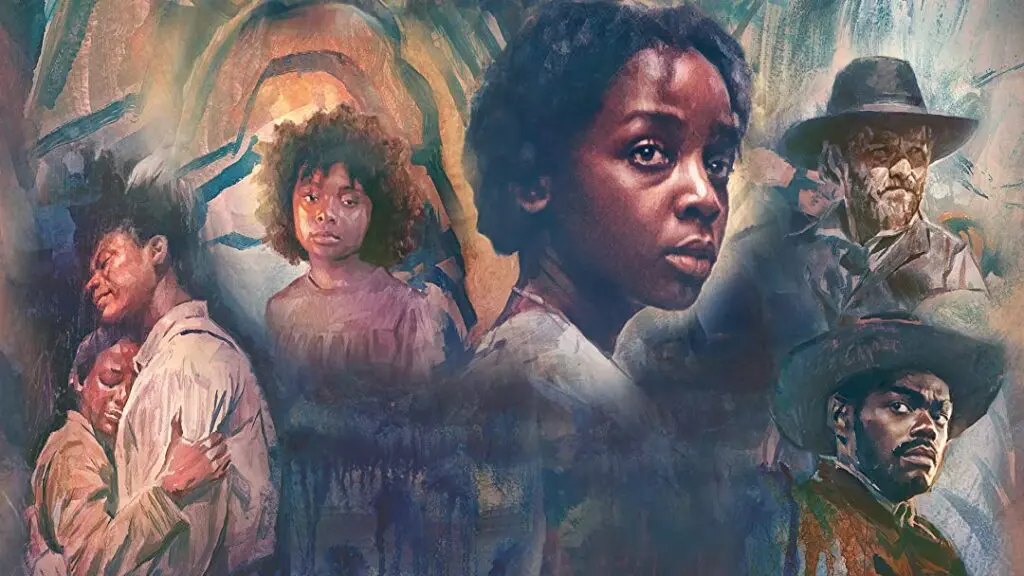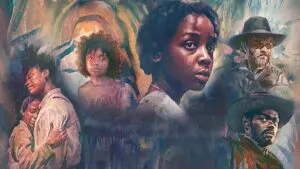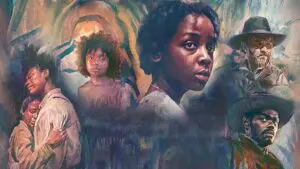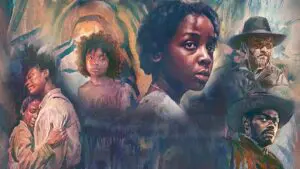Summary
Things are not what they seem in “Chapter 2: South Carolina”, as even new lives can’t hide Cora and Caesar from their pursuers or their past.
This recap of The Underground Railroad episode 2, “Chapter 2: South Carolina”, contains spoilers.
If it wasn’t for an opening scene in which Ridgeway and Homer investigate Cora’s disappearance from the plantation, “Chapter 2: South Carolina” could almost be a different show, one in which Black people are gainfully employed, treated as almost human beings. Not that the facade withstands much scrutiny. Several women, among them Bessie, dress up as their African ancestors to depict, for the benefit of a curious white audience, the savagery of native, tribal Africa before its people were “saved” and “uplifted” by the white man. Someone like Mr. Fields might be relatively polite to his employees, but his utterance of FUBU — for us, by us — isn’t that dissimilar from the crack of a whip when you really think about it.
Miss Lucy, a teacher who makes no secret of the fact that simply allowing Black folks to learn would have her fined $100 dollars in Georgia and earn the students 39 lashes each, seems kindly, but there is something sinister behind her smile, even when she gifts Bessie a copy of Gulliver’s Travels, the book Caesar was reading to Cora in the premiere. Miss Lucy fronts as being “not like the rest of them”, a sentiment echoed shortly afterward by a doctor who speaks with a worker named Christian after a workplace incident and says that sentence outright. Nobody wants to think they’re “like the rest of them”; almost everybody is.
Christian can read, though what he reads — The Odyssey, in this case — is still the subject of some concern, which he rightly suggests is almost the same thing as not being allowed to read at all. Both Christian and Bessie know better than their smiling white benefactors what the real Black experience elsewhere in America is like since they are Cora and Caesar, reinvented in this new life, infinitely better than the one they ran from but still not quite freedom — “The South is the South”, Caesar says to Cora later, when he suggests that perhaps they should stay in South Carolina instead of getting the next train. With a new job, and a new name, one more honorable than any given to them by their former masters, Caesar sees something in this game of pretend. “One kiss and you’re talking about babies, huh?” laughs Cora, who reminds him they’re in this together. She won’t get on a train without him, she insists, although by the end of “Chapter 2: South Caroline”, she has.
The Underground Railroad episode 2 is about, in many ways, all the reasons there are to get on that train after all; all the rot beneath the surface of a self-congratulatory culture in which a white man demonstrating how to whip a slave for the purposes of a museum exhibit quite clearly exposes deep-seated sadism. The whites in “Chapter 2: South Carolina”, so adamant that they’re different and better, are not far removed from the plantation masters. They’re still the ones holding the whip.
Every seemingly altruistic measure introduced by the white establishment in South Carolina has a sinister undertone to it. Free “vitamins” with store purchases. A sterilization procedure for Negro women that is, of course, mandatory for women who have had two children, who are imbeciles, or who are habitual criminals. For women like Cora, it’s presented as a wonderful opportunity to be freed from the burden of childbirth, and not the punishment it clearly was to those whom it was forced upon. There’s a particular focus on the children of Black women in this episode. A character named Meg insists that “they” have been taking her babies. Behind closed doors, men in earshot of her crying and wailing discuss her as if we’re back in Georgia, and when Ridgeway and Homer arrive in the bar, the proprietor is quick to summon the Sheriff rather than treat Homer as a guest. This establishment exists just outside of the town of Griffin where the rest of the episode’s events take place, geographically, but it being a day or two’s ride away doesn’t suggest that the quiet sentiments of the white folks there are any different from the overt ones of the bartenders and bounty hunters Ridgeway speaks with here.
Cora’s nightmarish encounters with other women at the clinic, and Caeser’s factory colleague vomiting blood the more vitamins he takes, begin to peel away Griffin’s facade. Cora asking Miss Lucy where all the Negro children are visibly wrenches the fake smile from her face. She explains to Cora that, thanks to their altruistic programs, the population has increased fivefold, and thus mothers and their children are moved on to Evansville. Suddenly, the sterilization procedure becomes mandatory for her. When Caeser confronts his doctor employer with the so-called vitamins, he’s told to sacrifice the life of his poisoned colleague for science, for the study of the Black body. These revelations come at the same time; both are justified on the same basis, as being in the best interests of the Negro people. But they are, as Caeser explains to Cora and Sam, “dark and horrific things.” He adds, powerfully, “The n*gger shall not prosper, lest he prosper in the white man’s vision of him.” The powers-that-be in Griffin are poisoning the men and “cutting the women”. The question becomes, when is the train coming? And, furthermore, what to do in the meantime?
Sam is as shocked to hear about the darkness in Griffin as Caesar and Cora were to discover it. He was fooled by the novelty of Black folks being treated even halfway fairly; he never thought to question why, or how, ideas of Black people would be so different here than they are elsewhere. Accepting that Griffin is as insidious and dangerous a place as Georgia ruptures his fantasy of emancipation; of the Railroad’s purpose. He has unknowingly delivered his charges out of the frying pan and into the fire.
What to make of Miss Lucy, who treats Ridgeway with obvious derision, sarcastically commenting on his “noble” profession of slave catcher? What to make of Homer catching sight of Cora through the glass of the museum display where she is performatively picking cotton, and him trying to apprehend her himself? (You could build a whole other show about Homer alone.) Mr. Fields tries his best to work this incident into his depiction of barbaric Southern life — but as Caesar said earlier, the South is still the South.
For the first time in The Underground Railroad episode 2, Ridgeway and Caeser come face to face. The former remarks on the latter’s very particular eyes, whispering that he’s a long way from home. The scene is laden with tension. It took Ridgeway scarcely one episode to catch up with Cora and Caesar, even accounting for new lives and identities. How could freedom have possibly existed so close to bondage? Is freedom even possible? Even when Cora returns to the Railroad and flags down a maintenance train driven by a young man named Ellis, she’s forced to ride in “coach”, tied down — bound — in the carriage. Protocol and procedure must be followed, after all.




